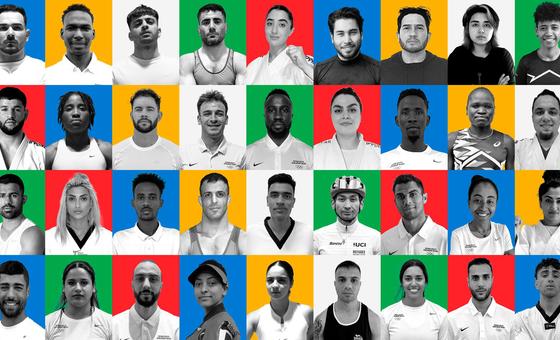The 36 athletes were announced on Thursday by the President of the International Olympic Committee (IOC), Thomas Bach, during a live-streamed ceremony from Lausanne, Switzerland.
They come from 11 countries and will compete across 12 sports.
Resilience and excellence
“With your participation in the Olympic Games, you will demonstrate the human potential of resilience and excellence. This will send a message of hope to the more than 100 million displaced people around the world. At the same time, you will make billions of people around the world aware of the magnitude of the refugee crisis,” Mr. Bach said.
The composition of the team was approved by the IOC Executive Board and was based on a number of criteria including, first and foremost, each athlete’s sporting performance and their refugee status, as verified by the UN refugee agency, UNHCR.
For the most part, they were selected from among the refugee athletes supported by the IOC through a scholarship programme.
Transformative power of sport
UN High Commissioner for Refugees Filippo Grandi said the Refugee Olympic Team should remind everyone of the resilience, courage and hopes of all those uprooted by war and persecution.
“The team also reminds us that sport can be transformative for people whose lives have been disrupted in often harrowing circumstances. Transformative not just for Olympians, but for everyone,” he added.
Paris will mark the third appearance at the Olympics of a refugee team, which debuted at the 2016 Games in Rio de Janeiro, and this year’s squad is the largest so far.
Flying their own flag
For the first time, the team will compete under its own emblem, instead of the Olympic flag with its signature five interlocked rings in blue, black, red, yellow and green on a white background.
Their emblem has a heart surrounded by way marker arrows and uses the same colours as the Olympic flag.
“Having our own emblem creates a sense of belonging and empowers us to also stand for the population of more than 100 million people who share this same experience,” said Team Captain Masomah Ali Zada from Afghanistan, who competed in cycling at the 2020 Games in Tokyo.

Afghanistan’s first female breakdancer, Manizha Talash, practises during a training session.
Meet the athletes
In Paris, the team will be vying for medals in sports that include breaking – a first at the Olympics – and Manizha Talash from Afghanistan will get to showcase her moves. She is the country’s first female breakdancer, according to media reports.
Cindy Ngamba was born in Cameroon and moved to the United Kingdom at 11. She was always interested in sports and initially joined a football team, but later discovered her true passion: boxing.
Ms. Ngamba trains with the elite amateur GB Boxing Team and is a three-time English national champion. She also made history by becoming the first ever refugee boxer to qualify for the Olympics.
Adnan Khankan has loved judo since he was a boy in Syria, where he joined the national junior team and participated in continental championships. War forced him to flee, and he settled in Germany. He recalled watching the Refugee Olympic Team in 2016 as a moment that truly gave him hope.
Talented shooter Francisco Edilio Centevo Nieves was ranked number one in Venezuela and used to run a training academy where he coached people in the sport. He left his homeland together with his sister and now lives in Mexico.
Profiles of all the athletes are on the IOC website for the Refugee Olympic Team as they prepare for Paris, and people everywhere can follow their progress on social media channels.

